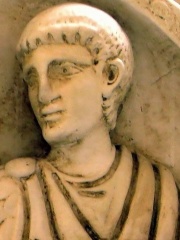
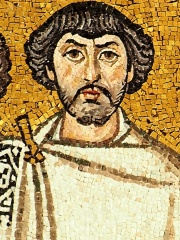
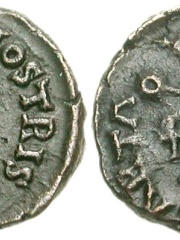
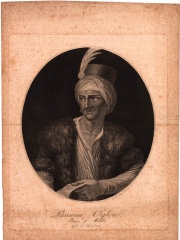
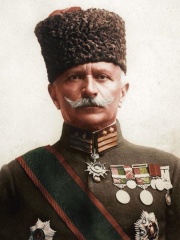
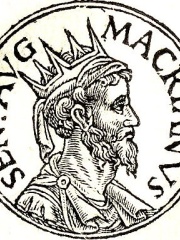
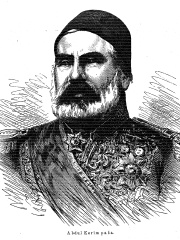
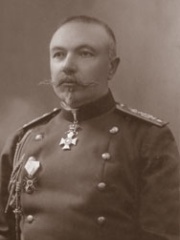
The Most Famous
MILITARY PERSONNELS from Bulgaria
This page contains a list of the greatest Bulgarian Military Personnels. The pantheon dataset contains 2,058 Military Personnels, 10 of which were born in Bulgaria. This makes Bulgaria the birth place of the 25th most number of Military Personnels behind Saudi Arabia, and Bosnia and Herzegovina.
Top 10
The following people are considered by Pantheon to be the top 10 most legendary Bulgarian Military Personnels of all time. This list of famous Bulgarian Military Personnels is sorted by HPI (Historical Popularity Index), a metric that aggregates information on a biography's online popularity. Visit the rankings page to view the entire list of Bulgarian Military Personnels.

1. Flavius Aetius (390 - 454)
With an HPI of 81.25, Flavius Aetius is the most famous Bulgarian Military Personnel. His biography has been translated into 64 different languages on wikipedia.
Flavius Aetius (also spelled Aëtius; Latin: [aːˈɛtiʊs]; c. 390 – 21 September 454) was a Roman general and statesman of the closing period of the Western Roman Empire. He was a military commander and the most influential man in the Empire for two decades (433–454). He managed policy in regard to the attacks of barbarian federates settled throughout the West. Notably, he mustered a large Roman and allied (foederati) army in the Battle of the Catalaunian Plains, ending an invasion of Gaul by Attila in 451, though the Hun and his subjugated allies still managed to invade Italy the following year, an incursion best remembered for the Sack of Aquileia and the intercession of Pope Leo I. In 454, he was assassinated by the emperor Valentinian III. Aetius has often been called the "Last of the Romans". Edward Gibbon refers to him as "the man universally celebrated as the terror of Barbarians and the support of the Republic" for his victory at the Catalaunian Plains. J.B. Bury notes, "That he was the one prop and stay of the Western Empire during his life time was the unanimous verdict of his contemporaries."

2. Belisarius (505 - 565)
With an HPI of 81.11, Belisarius is the 2nd most famous Bulgarian Military Personnel. His biography has been translated into 65 different languages.
Flavius Belisarius (Latin pronunciation: [bɛ.lɪˈsaː.ri.ʊs]; Greek: Βελισάριος; c. 500 – March 565) was a military commander of the Byzantine Empire under Emperor Justinian I. Belisarius was instrumental in the reconquest of much of the Mediterranean territory belonging to the former Western Roman Empire, which had been lost less than a century prior. He is considered one of the greatest military commanders of Byzantium and in history generally. One of the defining features of Belisarius' career was his success despite varying levels of available resources. He is frequently cited as being among the "Last of the Romans". He conquered the Vandal Kingdom of North Africa in the Vandalic War in nine months and conquered much of Italy during the Gothic War. He also defeated the Vandal armies in the battle of Ad Decimum and played an important role at Tricamarum, compelling the Vandal king, Gelimer, to surrender. During the Gothic War, despite being significantly outnumbered, he and his troops recaptured the city of Rome and then held out against great odds during the siege of Rome. After a setback at Thannurin, he won a battle against the Persians at Dara but was defeated at Callinicum. He successfully repulsed a Hunnic incursion at Melantias. He was also known for military deception; he repulsed a Persian invasion by deceiving their commander and lifted the siege of Ariminum without a fight.

3. Bonifacius (350 - 432)
With an HPI of 68.35, Bonifacius is the 3rd most famous Bulgarian Military Personnel. His biography has been translated into 23 different languages.
Bonifatius (or Bonifacius; also known as Count Boniface or Comes Bonifacius; died 432) was a Roman general and governor of the diocese of Africa. He campaigned against the Visigoths in Gaul and the Vandals in North Africa. An ally of Galla Placidia, mother and advisor of Valentinian III, Bonifacius engaged in Roman civil wars on her behalf against the generals Felix in 427-429 and Aetius in 432. Although he defeated the latter at the Battle of Rimini, Bonifacius suffered a fatal wound and was succeeded by his son-in-law Sebastianus as patricius of the Western Roman Empire.

4. Osman Pazvantoğlu (1758 - 1807)
With an HPI of 65.23, Osman Pazvantoğlu is the 4th most famous Bulgarian Military Personnel. His biography has been translated into 21 different languages.
Osman Pazvantoğlu (Ottoman Turkish: عثمان; 1758 – January 27, 1807 in Vidin) was an Ottoman mercenary, the de facto Vizier of the Sanjak of Vidin after 1794 as a rebel against Ottoman rule, amnestied and recognized in 1799 as pasha by the sultan, continuing rebellion the next year. Initially serving as a mercenary in Wallachia, he wrested the Sanjak of Vidin and ruled in defiance of the Ottoman sultan, and fought other Ottoman pashas and made incursions into the Sanjak of Smederevo, Wallachia, and Revolutionary Serbia during the Serbs' rebellion.

5. Vitalian (500 - 520)
With an HPI of 64.57, Vitalian is the 5th most famous Bulgarian Military Personnel. His biography has been translated into 20 different languages.
Vitalian (Latin: Vitalianus, Greek: Βιταλιανός; died 520) was a general of the Eastern Roman Empire. A native of Moesia in the northern Balkans, and probably of mixed Roman and Gothic or Scythian barbarian descent, he followed his father into the imperial army, and by 513 had become a senior commander in Thrace. In that year he rebelled against Emperor Anastasius I (r. 491–518), whose fiscal stringency and promotion of Miaphysitism were widely unpopular, and allowed Vitalian to quickly win over large parts of the army and the people of Thrace to his cause. After scoring a series of victories over loyalist armies, Vitalian came to threaten Constantinople itself, and forced Anastasius to officially recant his adoption of Miaphysitism in summer 515. Soon after, however, as Anastasius failed to honour some of the terms of the agreement, Vitalian marched on Constantinople, only to be decisively defeated by Anastasius' admiral, Marinus. Vitalian fled to his native Thrace and remained in hiding until Anastasius's death in 518. As a staunch promoter of Chalcedonian orthodoxy, he was pardoned by the new emperor Justin I (r. 518–527) and was engaged in the negotiations with the Pope to end the Acacian Schism. He was named consul for the year 520, but was murdered shortly after, probably on the orders of Justin's nephew and heir-apparent, Justinian (r. 527–565), who saw in him a potential rival for the throne. His sons also became generals in the East Roman army.

6. Fakhri Pasha (1868 - 1948)
With an HPI of 63.69, Fakhri Pasha is the 6th most famous Bulgarian Military Personnel. His biography has been translated into 22 different languages.
Ömer Fahrettin Türkkan (1868–1948), commonly known as Fakhri Pasha or Fahreddin Pasha and nicknamed the Defender of Medina, was a Turkish career officer who commanded Ottoman forces and served as governor of Medina from 1916 to 1919. His British and Arab opponents nicknamed him "The Lion of the Desert" and "The Tiger of the Desert" due to his determined defence of Medina from 10 June 1916 to 10 January 1919 during World War I.

7. Macrianus Major (250 - 261)
With an HPI of 62.49, Macrianus Major is the 7th most famous Bulgarian Military Personnel. His biography has been translated into 22 different languages.
Fulvius Macrianus (d. 261), also called Macrianus Major, was a Roman usurper. He was one of Valerian's fiscal officers. More precisely, sources refer to him as being in charge of the whole state accounts (A rationibus) or, in the language of a later age, as Count of the Treasury (Comes Sacrarum Largitionum) and the person in charge of markets and provisions. It seems almost certain that he was an Equestrian. The Historia Augusta claims that he was the foremost of Valerian's military commanders, but that is most likely a gross exaggeration, if not entirely fictitious. He followed Valerian during his ultimately catastrophic campaign against the Persians in 259 or 260; however, he remained at Samosata during the fatal battle of Edessa and his role in the events before and after the battle is questionable. After Valerian's capture by Sassanid Emperor Shapur I, Valerian's son Gallienus became sole emperor, but was occupied with his own problems in the West. Macrianus grabbed the opportunity. With the support of Balista, one of Valerian's military commanders, and with the influence that possession of the treasury of Valerian brought, Macrianus managed to have his two sons Macrianus Minor and Quietus elevated to the throne. He himself was not able to assume the purple because he was deformed in one of his legs. Quietus and Balista stayed in the East to secure their rule. Macrianus Major and Minor marched the eastern army from Asia to Europe, but were defeated in Thrace in 261 by Aureolus. Macrianus and his son were killed in the battle. According to Joannes Zonaras, their army was encircled by Aureolus and surrendered, except for the Pannonian legions. Macrianus asked to be killed with his son to avoid delivery to Aureolus. Quietus was later murdered by Odaenathus of Palmyra.

8. Abdülkerim Nadir Pasha (1807 - 1883)
With an HPI of 61.78, Abdülkerim Nadir Pasha is the 8th most famous Bulgarian Military Personnel. Her biography has been translated into 21 different languages.
Abdülkerim Nâdir Pasha (1807–1883), also known as Çırpanlı Abdi Pasha or Abdul Kerim Pasha, son of Ahmed Pasha, was an Ottoman military commander.

9. Nikola Ivanov (1861 - 1940)
With an HPI of 58.38, Nikola Ivanov is the 9th most famous Bulgarian Military Personnel. His biography has been translated into 20 different languages.
Nikola Ivanov Ivanov (Bulgarian: Никола Иванов Иванов) (2 March 1861, Kalofer – 10 September 1940, Sofia) was a Bulgarian general and a minister of defence of the Principality of Bulgaria. One of the first graduate of the General Staff Military Academy of St Petersburg, he fought as a volunteer during the Russo-Turkish War (1877–1878). Ivanov then became chief of the Headquarters of the Bulgarian Army between 10 May 1894 and 29 November 1896 then minister of war between 29 November 1896 and 30 January 1899. During the First Balkan War, Ivanov lead the Bulgarian Second Army throughout the successful Siege of Adrianople. On 4 July his army was defeated at the Battle of Kilkis–Lachanas during the Second Balkan War, a month later his troops succeeded in halting the oncoming Greek army at the Battle of Kresna Gorge as the catastrophic Second Balkan War came to an end.
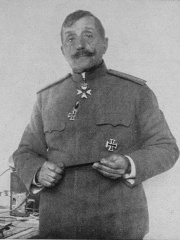
10. Stefan Toshev (1859 - 1924)
With an HPI of 55.81, Stefan Toshev is the 10th most famous Bulgarian Military Personnel. His biography has been translated into 15 different languages.
Stefan Toshev (Bulgarian: Стефан Тошев) (18 December 1859 – 27 November 1924) was a Bulgarian general, from World War I. His mother was a teacher from the period of the National Revival. He volunteered in the Bulgarian Opalchentsi Corps during the Russo-Turkish War (1877–1878) and later served as a translator. On 10 May 1879, he graduated from the Military School in Sofia in its first year. Then he served in the Police force of Eastern Rumelia.
People
Pantheon has 10 people classified as Bulgarian military personnels born between 250 and 1868. Of these 10, none of them are still alive today. The most famous deceased Bulgarian military personnels include Flavius Aetius, Belisarius, and Bonifacius.
Deceased Bulgarian Military Personnels
Go to all RankingsFlavius Aetius
390 - 454
HPI: 81.25
Belisarius
505 - 565
HPI: 81.11
Bonifacius
350 - 432
HPI: 68.35
Osman Pazvantoğlu
1758 - 1807
HPI: 65.23
Vitalian
500 - 520
HPI: 64.57
Fakhri Pasha
1868 - 1948
HPI: 63.69
Macrianus Major
250 - 261
HPI: 62.49
Abdülkerim Nadir Pasha
1807 - 1883
HPI: 61.78
Nikola Ivanov
1861 - 1940
HPI: 58.38
Stefan Toshev
1859 - 1924
HPI: 55.81
Overlapping Lives
Which Military Personnels were alive at the same time? This visualization shows the lifespans of the 5 most globally memorable Military Personnels since 1700.

